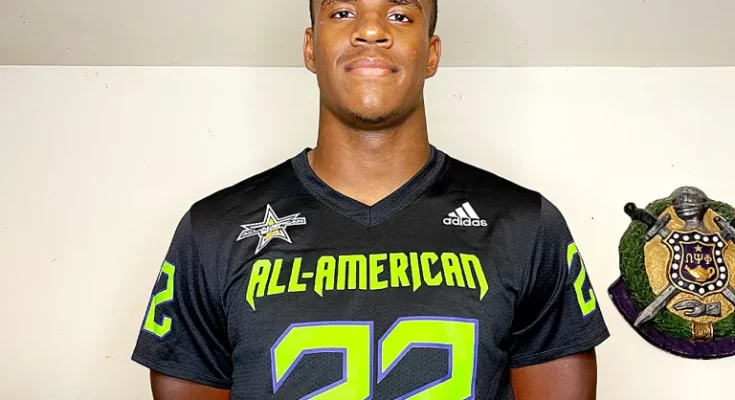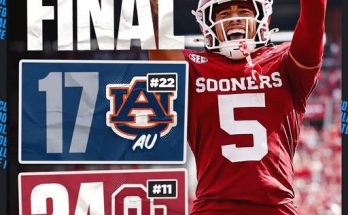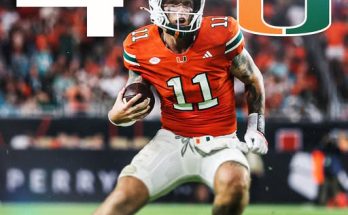amil Wagner will probably never forget the moment he lined up across from a player whose nickname among teammates was “Darth Vader.” It wasn’t just the heavy black visor or the reputation that preceded him—it was the sheer presence, the intensity, the way the crowd seemed to hum with tension every time the ball was snapped. The game was more than just a clash between two storied programs; it became, for Wagner, a personal proving ground. Notre Dame versus Penn State had already captured national attention, a primetime showdown with playoff implications and layers of history. But for Wagner, an offensive tackle still carving out his place in the Fighting Irish rotation, this game became unforgettable because of one battle in the trenches that felt more like a cinematic showdown than a college football play.
Wagner, a native of Dayton, Ohio, knew that stepping into a high-stakes game like this would challenge him mentally, physically, and emotionally. Notre Dame’s coaching staff had talked up the ferocity of Penn State’s defensive line, but what stood out most was the film study on one particular player—Penn State’s fearsome edge rusher, affectionately known by his teammates as “Darth Vader.” His real name barely mattered by the time game day rolled around. The mythos of the nickname had taken over. He was known for his aggressive swim moves, his ability to disrupt plays before they began, and the intimidating, almost robotic composure he brought to every snap. With a dark visor and all-black gloves, “Darth Vader” looked like something out of a nightmare—at least until you realized he was real and he was charging right at you.
When Wagner recalled the game later to reporters, it wasn’t the final score—Notre Dame’s hard-earned win—or even a specific block that stood out to him. It was the feeling of survival, of constantly adjusting, of learning in real time how to keep up with a pass rusher who didn’t seem to slow down. Every series presented new challenges. “He kept switching up,” Wagner said, eyes wide with memory. “One play he’s trying to bull rush you straight through your chest, the next he’s spinning, bending low, using your own leverage against you. You think you’ve got him figured out, and then he hits you with something you’ve never seen on tape.” For Wagner, the battle was a crash course in what elite defensive play truly looks like at the highest level of college football.
The Fighting Irish had spent the week emphasizing communication and cohesion along the offensive line. Wagner had rotated in several times already during the season, but the Penn State matchup marked his most significant playing time against top-tier competition. He wasn’t a starter on the depth chart, but Notre Dame’s staff believed in his potential and put him into critical situations. Facing off against “Darth Vader” wasn’t just a test; it was an opportunity to rise. And Wagner, with all the nerves and adrenaline coursing through him, embraced it.
One play stood out above the rest. Third and long, Notre Dame clinging to a narrow lead with under six minutes left in the fourth quarter. The Penn State defense had just forced an incompletion on second down, and the roar of the crowd inside Notre Dame Stadium was almost overwhelming. Wagner knew what was coming. Everyone did. Vader—whose real name Wagner finally admitted later he never even asked—lined up wide, crouched low like a sprinter about to burst out of the blocks. The ball was snapped. Wagner kicked out his stance and met the defender just as he bent around the edge. Their hands collided first, then shoulders, a sudden explosion of force and momentum. Wagner dug in, resetting his feet, absorbing the hit, riding the defender’s momentum just far enough past the quarterback for the pass to be completed.
Wagner didn’t celebrate. There was no chest-thumping or trash talk. He just turned back to the huddle, exhaled hard, and prepared for the next play. That moment defined his night—a quiet, relentless commitment to the job, to protecting his quarterback, to surviving every pass rush from one of the most feared players on the opposing sideline.
The nickname “Darth Vader” wasn’t just a gimmick. Coaches across the Big Ten and beyond had taken note of the defender’s impact. His burst off the line was elite. His hands were violent, his motor relentless. Wagner came away from the game with bruises and sore ribs, but also with something more valuable—a sense that he could hang at this level. “You come in thinking you’re ready,” he said. “But nothing prepares you for that until you go through it. I’ve got all the respect in the world for that dude. He made me better.”
Notre Dame’s offensive line coach echoed Wagner’s sentiment. After the game, he told reporters how proud he was of Wagner’s composure. “You don’t win games like this unless guys step up when the lights are the brightest,” he said. “Aamil did that. He stayed calm, trusted his technique, and went toe to toe with a player who’s gonna be making money on Sundays.”
That game helped catapult Wagner into a new light within the Notre Dame program. No longer just a promising second-stringer, he was now a player with real-game experience against elite competition. The coaching staff began to work him more aggressively into the rotation. His confidence grew. The player who once hesitated to speak up in meetings now offered insights about defensive tendencies, about recognizing blitz alignments, about hand placement and leverage and split-second reactions. It wasn’t just the battle with “Darth Vader” that changed him—it was the realization that he belonged.
For Wagner, the journey to that moment wasn’t linear. He had come to Notre Dame as a highly-touted recruit, full of potential but needing polish. Coaches believed in his frame, his athleticism, his ability to move fluidly for a big man. But raw talent doesn’t always translate instantly to playing time. Wagner had to work through growing pains, through tough practices, through the mental grind of staying ready even when not starting. That’s why the Penn State game mattered so much. It validated every rep, every early-morning film session, every time he chose to stay late after practice refining his footwork.
Looking back, Wagner doesn’t speak about the game in terms of heroism or ego. He talks about learning, about being stretched to his limits, about the moment when everything slowed down just enough for him to react with precision rather than panic. “I’ll remember that game not just because we won, but because I found something out about myself,” he said. “I learned I could handle it.”
His teammates took notice too. In the locker room after the win, amid the celebration and music and laughter, several veterans approached Wagner to tell him how much they appreciated his effort. One lineman slapped him on the back and simply said, “You earned it tonight.” Those five words stuck with Wagner more than any highlight clip or stat line. He had earned it—not because he dominated, not because he was flawless, but because he endured and responded when tested.
Notre Dame’s coaching staff has since pointed to Wagner’s performance that night as an example for younger players. When preparing for future matchups, they’ll often bring up that game film, not just to show what Penn State’s defense brings, but to illustrate how a player can grow in real time when pushed. Wagner’s name comes up in those conversations more and more often. His role continues to expand. The player who once studied quietly on the sidelines is now offering guidance to the next wave of offensive linemen.
In the broader context of Notre Dame football, the win over Penn State was a statement. The Fighting Irish had weathered adversity, matched physicality with physicality, and emerged with a resume-boosting victory. But within that larger narrative, Wagner’s personal subplot resonated as well. It was a story of readiness, of belief, of quiet perseverance. It reminded everyone that college football isn’t just about stars and stats—it’s about moments, matchups, and how a player responds when face-to-face with someone who looks like a villain straight out of a blockbuster movie.
Aamil Wagner’s tale from that night will live on in Notre Dame lore—not because he pancaked “Darth Vader” or delivered a viral block, but because he survived and adapted. He did his job under fire. And in doing so, he helped his team win. There are no awards for that kind of grit. But anyone who watched the film knows exactly what it meant.
Years from now, when Wagner’s playing days are behind him, when he’s coaching or speaking to young athletes, he’ll probably tell them the story—not about the time he scored or ran with the ball, but about the night he went one-on-one with “Darth Vader” and held his ground. Because that’s what real growth looks like. That’s what football is all about.



